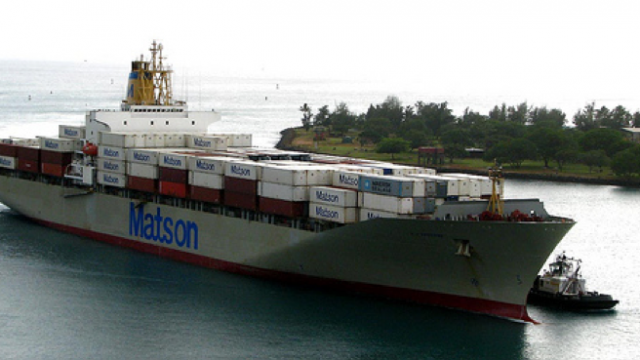Task force: Unshackle Hawaii from archaic shipping regulation

NOT-SO-FREE MARKET: Horizon and Matson control Hawaii’s shipping market because of Jones Act requirements, but a task force said the energy market is better served with foreign competition,
By Malia Zimmerman | Watchdog.org
HONOLULU — Some 2,500 miles from any landmass, the Hawaiian islands are largely dependent on two small oil refineries for its energy needs.
But a 30-member task force convened by Gov. Neil Abercrombie to address energy security in Hawaii says the state needs an exemption from the 1920s-era Jones Act that requires all goods shipped within the United States be transported by American-made and American-manned ships.
The federal law, which impacts goods delivered to Hawaii, including oil, is hotly debated among politicians, business owners and organized labor unions in Hawaii.
Proponents maintain the law ensures job security and national security, while opponents support foreign competition, saying it will reduce the cost of goods by as much as 35 percent.
The Hawaii State Energy Office and two consultants, ICF International and Poten & Partners Inc., drafted the Hawaii Refinery Task Force Final Report released in April, which details Hawaii’s vulnerability should the state’s only refineries, Chevron Corp. and PAR Petroleum Corp., close.
Michael Hansen, president of the Hawaii Shippers Council, said the governor convened the task force after Tesoro Corp., closed its refinery in 2013. PAR Petroleum purchased and re-opened the refinery in September after it had been shut down for months, but the closure drove home the state’s energy vulnerability.
“Although the PAR Petroleum purchase seemingly saved the former Tesoro refinery from permanent closure, the combined capacity of the two refineries — approximately 150,000 barrels per day — is greater than local demand. The two refineries are collectively operating at significantly less than full capacity and the conventional wisdom is that both refineries cannot continue on this basis,” Hansen said.
Given the potential for future refinery closures, Hansen said the task force suggested a Jones Act exemption allowing foreign-flag tankers to carry petroleum cargoes in the domestic Hawaii trade would mitigate effects.
“Such an exemption would not only be valuable in the instance of refinery closures, but should also be actively pursued in the absence of a closure to lower the costs and extend the life of ongoing refinery operations to benefit consumers, taxpayers and businesses in the state,” Hansen said.
Because Hawaii imports fuel, the report said it’s important for Hawaii suppliers to have access to the broadest market for petroleum products.
“During the Tesoro transition period, virtually all products imported were foreign, primarily from Asia but also from as far away as Europe. Tesoro indicated that domestic supply was not competitive, in part due to Jones Act restrictions and cost versus foreign flag,” the report said.
From the late 1970s through the mid 2000s, the majority of the crude oil refined in Hawaii was from the Alaska North Slope. It arrived in the islands through the Trans-Alaska Pipeline System and was shipped from the tidewater at Valdez, Alaska, Hansen said. Today most of the crude oil refined in Hawaii is light sweet crudes imported primarily from southeast Asia.
The exemption also would more easily allow liquefied natural gas to be imported into Hawaii, for which Abercrombie has pushed.
Congress and President Obama must give Hawaii the exemption, but Hawaii’s congressional delegation, including U.S. Sens. Brian Schatz and Mazie Hirono and U.S. Reps. Colleen Hanabusa and Tulsi Gabbard — all Democrats — have been unwilling to push for it.
Shipping labor unions and shipping companies, which have control of the marketplace, also have fought against the exemption for Hawaii.
Abercrombie was a vocal advocate of the Jones Act while he served in Congress, but he said he supports the task force’s recommendations.
“This final report validates the importance of a sustained and reliable energy supply for the people of Hawaii,” Abercrombie said.
Reach Malia Zimmerman at Malia@hawaiireporter.com







